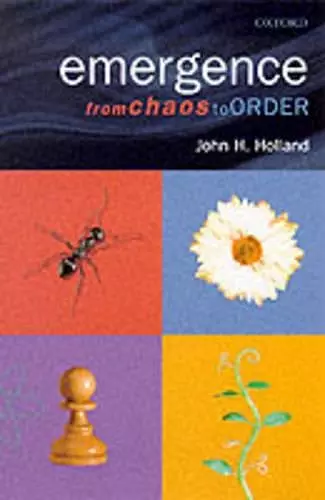Emergence
From Chaos to Order
Format:Paperback
Publisher:Oxford University Press
Currently unavailable, and unfortunately no date known when it will be back

This new book, by acclaimed scientist- John Holland, introduces the reader to the exciting new theory of 'emergence', which many people now consider to be the single most characteristic feature of complex, adaptive systems. By 'emergence' it is meant that such systems tend to involve large numbers of intelligent, adaptive agents, interacting on the basis of local information possessed by each agent. These interactions produce global behaviour that cannot be understood simply by knowledge of the individual agents; it is 'emergent behaviour'. Examples of phenomena of this kind are price movements on speculative markets (where agents are individual traders) or road-traffic patterns (where the agents are individual drivers). The book explores the theory of 'emergence', demonstrating how a small number of rules or laws can generate systems of surprising complexity. Board games provide an ancient and direct example: Chess is defined by fewer than two dozen rules, but the myriad patterns that result lead to perpetual novelty and emergence. The discovery of similar patterns in other facets of our world opens the way to a deeper understanding of the complexity of life, answering such questions as: How does a fertilised egg program the development of a trillion-cell organism? How can we build human organisations that respond rapidly to change through innovation? Throughout the book, Holland compares the different systems and models that exhibit emergence in the quest for common rule or laws. These range from the tiny seed "that encloses specifications that produce structures as complicated and distinctive as the giant redwood and the common daisy", to the checkers-playing computer that learned to beat its creator consistently, to the ant colonies that build bridges over chasms and navigate leaf-boats on streams, to the emotive creations of the past. All are explored in a book that will have important ramifications for every aspect of human intellectual endeavour. Reviews "John Holland is an exceptionally imaginative person. Often surprising, and always engaging, he takes the reader on a journey from simplicity to complexity, showing how a few 'rules of engagement' can lead to systems as bewilderingly rich as the neural networks in our brains, our immune defenses against pathogens, and even the ecosystems that maintain the biosphere so that life can flourish" Sir Robert May, Chief Scientific Advisor...
ISBN: 9780192862112
Dimensions: 197mm x 129mm x 16mm
Weight: 208g
274 pages